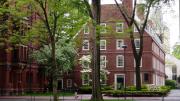The University will bargain with the newly elected graduate-student union, provost Alan Garber wrote in an email to the Harvard community this afternoon. “In light of the outcome of the vote and the existing NLRB precedent [on the collective bargaining rights of graduate students], Harvard is prepared to begin good-faith negotiations, guided by our fundamental commitments as an academic institution,” he stated.
Last month, Harvard graduate students voted 1,931-1,523 to form a labor union. The election result was certified on Monday, April 30, after neither the University nor the Harvard Graduate Student Union-United Auto Workers (HGSU-UAW) filed an objection to the vote count within the seven-day window. The new union covers a bargaining unit of about 5,000 research and teaching assistants from across Harvard’s schools, including the Graduate School of Arts and Sciences, the professional schools, and the College.
“We applaud Harvard for doing the right thing and honoring the results of our majority vote in favor of a union,” said economics Ph.D. candidate Justin Bloesch in a statement from HGSU-UAW. “We look forward to negotiating with them in good faith—and making progress on issues like sexual harassment and assault, improved conditions for international workers, predictable workloads, compensation and more.”
Garber’s email outlined “three fundamental principles” that will guide Harvard’s approach to bargaining.
“First, we must protect the integrity of our teaching mission. Harvard University, across its diverse schools and programs, is dedicated to providing the best possible education to our students, both graduate and undergraduate,” he wrote. “Decisions such as who is admitted, how teaching occurs, and who teaches, are academic judgments to be made by the University. We are not under any obligation to negotiate with the United Auto Workers about academic matters, and will not do so.”
“Second, we must protect the academic freedom that undergirds our research mission,” he continued. “In order to play their role effectively, faculty must be able to exercise their responsibility to manage and oversee matters relating to research. Within a context of mutual respect, academic freedom is essential to our faculty’s ability to advance knowledge.”
Finally, Garber stressed the need to represent the diverse needs and interests of all students. “Since the election, I have received messages from students who voted against the union and are concerned that majority-rule union decision-making will not take account of their needs and particular circumstances,” he wrote. “Current union organizers have provided reassurances that they will represent all members of their bargaining unit fairly. They will face the challenge of accommodating the unprecedented diversity of positions, responsibilities, pay structures, and programs encompassed by the bargaining unit. Furthermore, an agreement reached with the union may have consequences for other students who interact with union members in classrooms, laboratories, and other settings. Harvard will uphold its responsibility to every student, both those who are represented by the union and those who are not.”
Harvard’s decision to bargain contrasts with those made by other private universities—Columbia, Yale, and the University of Chicago—where administrators have refused to bargain with student unions. This past January, Columbia provost John Coatsworth wrote in an email to students there (72 percent of whom voted to unionize in December 2016) that the school would seek judicial review of the NLRB’s August 2016 decision to extend collective-bargaining rights to graduate students: “We remain convinced that the relationship of graduate students to the faculty that instruct them must not be reduced to ordinary terms of employment,” he stated. “While the National Labor Relations Board’s position on student assistants has shifted repeatedly with changes in political administrations, the University’s view has remained constant, as has our well-established record of collective bargaining with the several unions that appropriately represent thousands of Columbia employees.”
These arguments closely mirror those that Harvard had made throughout the graduate-student unionization campaign. The NLRB, meanwhile, has reversed its position on the union rights of graduate students twice since 2000, with changes in presidential administrations, and is widely thought likely to do so again.









